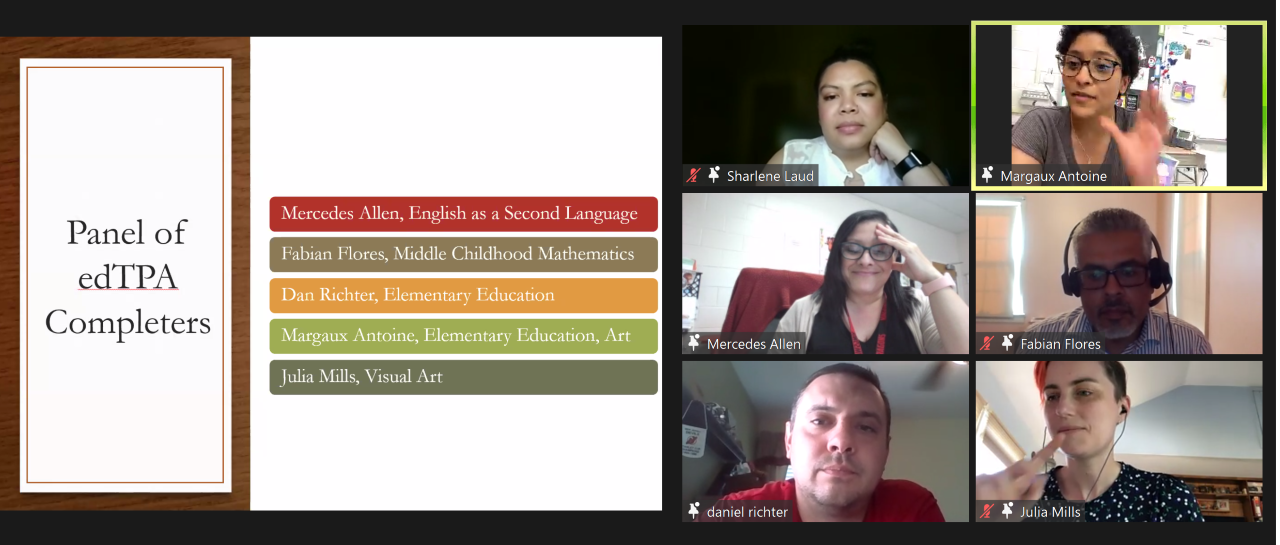4 Big Takeaways from the Rutgers Alternate Route edTPA Panel

Recently, Rutgers Alternate Route hosted a virtual panel on how to pass the edTPA,the State-mandated teaching performance assessment required for teaching certification in New Jersey. The assessment is used nationally and measures the skills and knowledge of new and aspiring teachers, providing Alternate Route candidates a valuable opportunity to demonstrate their competency in the classroom while building a reflective teaching practice.
The edTPA is a big undertaking and requires a significant time investment, which is why we pulled together a group of second-year teachers with valuable insight to share with new teachers preparing for their own edTPA. Our panelists, all successful edTPA completers, represented a variety of content areas and grade levels, and each offered plenty of great advice for those about to take the edTPA.
If you've been keeping up with Alternate Route's content over the past year, you may recognize some familiar names. In November, Julia Mills offered personal tips for taking the edTPA and last July, Margaux Antoine spoke to us about how her experience as an Alternate Route intern set her up for success in her field.
If you missed the panel, you can access the recording here, using the password edTPApanel_2.
Read on for the four most important takeaways our panelists had to offer.
1. Be prepared
The number one lesson our panelists discussed was the importance of being prepared for the edTPA.
“If anyone wants to learn what not to do, come see me,” said panelist Mercedes Allen, who teaches ESL. “I’m a procrastinator, so I put it off. I thought that if I waited, it would just go away. It didn’t.”
With all that’s involved in taking the edTPA, procrastination will only cause extra stress. Approaching the workload head on is daunting, which elementary art teacher Margaux Antoine can attest to, but it’s important to give yourself time to do your best work.
“Learn from our mistakes and our tears,” she said. “It’s not scary and it's not hard, it's just a lot.”
Allen recommends starting the process in January, with February being the very latest.
“You have a good idea of what you’re going to be teaching after the holiday break and you won’t be rushing,” she said of January’s timing.
To tackle the overwhelming task, art teacher Julia Mills took a critical approach to organizing her work.
“It's almost like a puzzle,” Mills said during the panel. “You want to set your lessons up for success, so spend time on the front end planning and reading the rubrics. When you go to write it, you’ve done all the work, you’re just headed for success.”
2. Use your summer wisely
Summer break is the perfect time to start light preparation. This includes getting in the right headspace by becoming familiar with edTPA requirements, compiling your resources and talking to other educators about their experience.
“I was surprised at the hours I put into this. I’m talking 80, 100 hours,” Allen said.
Knowing there are hours of work ahead, using the summer to start organizing your edTPA plans will be beneficial when it comes time to do the heavy lifting. Mills recommends getting comfortable being on camera during this time.
“I was nervous about seeing myself on video, which is hilarious because we've all been teaching on video the past year,” Mills said.
Middle childhood mathematics teacher Fabian Flores recommends rereading the theories as another way to prep. The edTPA requires some discussion of education theories and research; summer is the perfect time to brush up on them so you have a clear grasp when it comes time to take the edTPA. For Flores, deadlines and organization are key.
“Don’t stress out too early, it’s not worth it,” he said. “Stay organized, stick to your deadlines and don’t get overwhelmed.”
Echoing Flores’ tip during the panel, elementary education teacher Daniel Richter says to get familiar with your handbook early and rely on it throughout your preparation.
“Don’t wait until the last minute,” he said. “Get familiar with the handbook and tasks you need to do so you can figure out your best lessons. I wish I looked at it sooner so I could keep things in the back of my head as I was teaching.”
3. Rely on your resources
Both Flores and Richter agree the handbook is absolutely critical when preparing for the edTPA.
“Print out the handbook and highlight what you need to highlight,” Flores said.
One mistake Antoine admitted during the panel was not using the handbook early enough. She had started a plan and changed it halfway through.
“I started in a place where I wasn’t fully understanding what the expectation was,” Antoine said. “I did my unit plan, and as I got deeper into the handbook, it wasn’t quite right.”
Antoine’s experience also highlights the necessary attention to detail that goes into the edTPA. What many panelists realized during their journey was that relying on resources organically fills in those details.
“Things need to be done a certain way,” Richter said. “My video file was corrupt, so don't let that happen to you.”
To avoid these problems, Richter recommends relying on the resources Rutgers Alternate Route provides to its candidates.
“I remember Rutgers gave us templates and I was able to use those templates for each task they gave us.”
Flores agrees with the importance of the Alternate Route practice templates provided as part of a mini-edTPA assignment designed to simulate the official Pearson assessment.
“Take those templates and those template due dates seriously,” he said.
For Allen, her Alternate Route training was essential and she encourages current candidates to pay close attention to their course assignments.
“You’re going to use all that information when you complete your edTPA,” she said, adding the benefit of going through both processes. “Rutgers Alternate Route and edTPA shined a light on little details I thought about, but would never really master.”
4. Involve others
Many panelists saw benefit in inviting other people on their edTPA journey, whether that’s having conversations, planning together or getting inspired by your students.
“Figure out what you'd like to do and share it with someone else, then share it with someone else again,” Antoine said.
By talking with other people about ideas and structure, you have a few different ideas to choose from. For Antoine, these decisions were the most difficult part of the process.
“Once I figured out what I was going to do, it wasn't that bad,” she said. “Teaching wasn't the hard part - figuring out what would work best for this specific puzzle was.”
Allen found success in using the study buddy approach. She paired up with a friend and would take turns reading out loud to each other. The strategy ended up being a great brainhack.
“When I read it out loud with a friend, hearing it made it connect to my brain,” she said. “Otherwise, I was just staring at the paper.”
Another approach Allen took was getting inspiration from physically being in the classroom. Even though the students were remote and she was alone in her room, the lively energy was still there.
“My books are here, all the kids’ stuff is here. Seeing that inspires me to do my best for them.”
For more tips and resources on edTPA prep, please see our other blogs on the topic: 5 Tips For Alternate Route Candidates Preparing For edTPA and 10 Time-Saving Tips For Teaching Candidates Preparing edTPA Video Portfolios.
If you’re considering following your dream of teaching, Rutgers Alternate Route can offer you the support and training you need to succeed. Be sure to follow Rutgers Alternate Route on Twitter and sign up for Alternate Route’s monthly newsletter for more information and stories from the field of education.

 Heather Ngoma has over 25 years of experience collaborating with educators across New Jersey to drive education innovation. She currently serves as the Director of the Rutgers-GSE Alternate Route Program in the Department of Learning and Teaching, a program which helps career changers, recent college graduates, and other aspiring education professionals become licensed teachers in New Jersey. Follow her on Twitter @heatherngoma.
Heather Ngoma has over 25 years of experience collaborating with educators across New Jersey to drive education innovation. She currently serves as the Director of the Rutgers-GSE Alternate Route Program in the Department of Learning and Teaching, a program which helps career changers, recent college graduates, and other aspiring education professionals become licensed teachers in New Jersey. Follow her on Twitter @heatherngoma.





